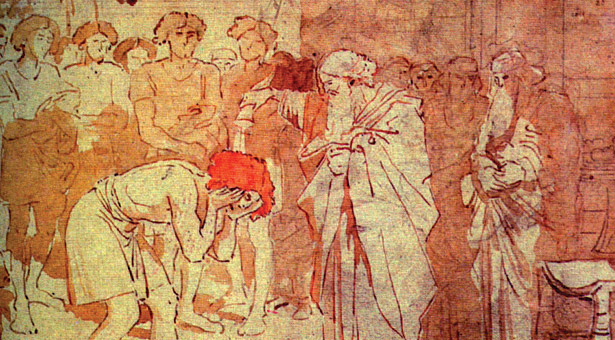The Bible & Theology Toward Christian Maturity
Outdone by the Almighty
How God’s Unbreakable Covenant Established A Forever Family
By Sara Koenig, Associate Professor of Biblical Studies
 Alexander Ivanov, Samuel Anoints David
to the Kingdom (circa 1850). Pen and
watercolor. (Wikiart.org)
Alexander Ivanov, Samuel Anoints David
to the Kingdom (circa 1850). Pen and
watercolor. (Wikiart.org)
As I get older, I get an eye examination every year to make certain that my eyeglass prescription still works. I’m asked to rest my chin on a stand and peer through two circles while the technician clicks different optics into position until I can see clearly. 2 Samuel 7 is like this: A lens through which much of the rest of the Bible should be viewed.
In this chapter, God makes an eternal, unconditional covenant with David, sometimes referred to as the Davidic covenant. Through the lens of this chapter, many subsequent events in the Bible become clearer, including why the united kingdom of Israel is divided into the two kingdoms of Israel and Judah in 1 Kings 11–12; the grounds by which the Israelites can protest the Babylonian Exile in Psalm 89; and why it matters that Jesus is a descendant of David.
2 Samuel 7:1 gives us the setting: David has been crowned king over all Israel, is settled in his “house” in his capital city Jerusalem, and is enjoying a time of peace. At this time David gets the idea to build a temple for God. David tells this idea to Nathan the prophet, who is supportive, saying, “Go, do all that you have in mind; for the LORD is with you” (7:3).
But that very night, God speaks to Nathan and tells Nathan to tell David “no.” David wanted to build God a house — a temple — but instead, God will build David a house: not a physical building, but a dynasty. People in the ancient world believed that if they did something for the gods, those gods would then do something for them. God, however, changes the equation from a transaction into an unmerited gift. This is a covenant — a relational document between two parties. Different synonyms such as “agreement” or “contract” capture some of what happens in a covenant, but don’t quite cover the nuances of the word. Covenants can be conditional, as is the Mosaic covenant, or unconditional, as is this covenant God makes with David.
Through Nathan, God explains that God never commanded any of Israel’s leaders to build a house. Second, in 2 Samuel 7:8–9 God reminds David of three things God has done for David in the past, saying, “I took you from the pasture, from following the sheep to be prince over my people Israel; and I have been with you wherever you went, and have cut off all your enemies from before you.”
Then, in 7:9–11, God gives three promises for the future, two of which are for David, and one of which is for Israel. God promises to “make for [David] a great name” (7:9) and give him “rest from all [his] enemies” (7:11). To Israel, God promises to “appoint a place” and “plant them, so that they may live in their own place,” where they will not be disturbed, nor afflicted by evildoers (7:10).
But the promises don’t stop there! Additionally, God declares that God will make a house for David by establishing a kingdom that will always be ruled by a descendant of David. This covenant is not only unconditional, but it is eternal; God uses the word “forever” three times to describe David’s kingdom (7:13, 16).
Christians understand the eternal nature of this covenant to reach full expression in Jesus Christ: the only begotten Son of God, the Messiah, the ultimate Davidic King whose kingdom is eternal.
Lectio: During Autumn Quarter 2015, Associate Professor of Biblical Studies Sara Koenig guides us through 1 and 2 Samuel.
